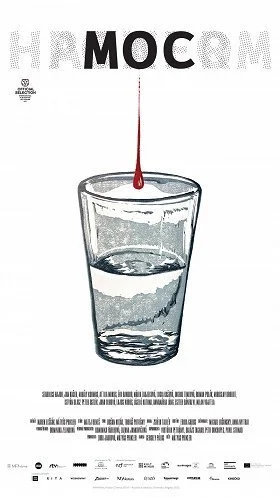The Absolute State Without (a) Single Man
Emilija Kvočka
In the political thriller "Power" by Matyas Prikler, the main characters find themselves bound and tainted with the blood of the innocent. During a hunting trip, an accidental murder occurs, implicating a minister, which the authorities are determined to cover up at all costs. The entire investigation is assigned to Steiner, a secret service detective, who will resolve the case not by uncovering the truth he already knows from the beginning but by finding someone to take the blame. The concept of power in this film will be depicted as powerlessness.
The film is dominated by a scenographic grayness, a merging of two extremes of the color spectrum - white and black. Gloomy skies and gray rooms of state institutions disrupt the green forests, which are soon sold off, as well as sources of clear water. Environmental protection is portrayed as deception and an opportunity for enrichment for certain structures or individuals, despite being natural resources that belong to all people. The whiteness of the snow is stained with the blood of animals hunted for sport, as well as the blood of innocent victims killed without premeditation. The setting in the film is borderland, with the tragedy unfolding between Slovakia and the Czech Republic, affecting the Hungarian population as well, manifested through a minority community, present and isolated, of which Steiner himself is a part. Steiner connects the afflicted people with those in power, and all three worlds, three levels of authority in the film, are confronted with a moral dilemma: to stand for the truth or to accept lies for the sake of mere survival or enrichment.
An indicative scene in the film is the lively wedding procession that interrupts a conversation between Steiner and a journalist investigating the murder case. She threatens to inform the public and reveal hidden facts. In the background, a popular traditional Hungarian song is heard, accompanying the joyful scene. The lyrics of the song tell the story of a boy asking the train conductor to take him to Velika Kanjiža, to his grandfather. The melody of this song was passionately sung in the spirit of the Communist Party of Czechoslovakia in the 1930s, with new lyrics referring to the proletariat and the noble Esterhazy family falsely promising "wheat and roasted pigeon." Allusions intertwine, highlighting the perennial game of the powerful, the interchangeability of systems, the manipulativeness, and corruption of a regime perpetually sustained by propaganda. Through motifs of innocent children's songs and images of wedding festivities, the film expresses the harsh and tragic fate of people in social regimes, both now and always, the suffering of the weak under the powerful, the heartlessness in relationships, and the current interchangeability of people in the world of politics.
"Without water, air, gas, land, and intellectual property, a person does not exist," the minister, the protector of the environment and natural resources, the culprit and the powerful, tells Steiner, who has never felt more powerless. There is much inhumanity in the film "Power." In the war of all against all in this film, instincts in people awaken and develop like those of beasts, man becomes a wolf to man, and a realm of complete darkness and selfishness reigns. Shots taken from an extreme high angle depict poor people in herds, and the shot animals illustrate the world and life as one big hunting ground with ruthless hunters and helpless prey.
As in Hobbes' Leviathan, the characters surrender their power for the sake of peace. Amidst interpersonal conflicts and relentless clashes, the characters grapple with themselves, with their personal beings, psychological and physical, moral and biological. The bearer of this conflict is precisely Steiner, and the authors thus create another challenging message of the film: questions of the soul and morality within a person who leads a difficult battle for life, which
he almost certainly loses and who, therefore, seems to have nothing to lose!? Or does he? He fights for the future of his son. But in a world of blackmail and corruption, man loses himself, his meaning, and his dignity. What is a crime? Where is the punishment? Who is to blame? Who else cares about the truth? Whose hands are still clean and whose soul is blameless when they close their eyes for the last time? A powerful and provocative film achievement.

